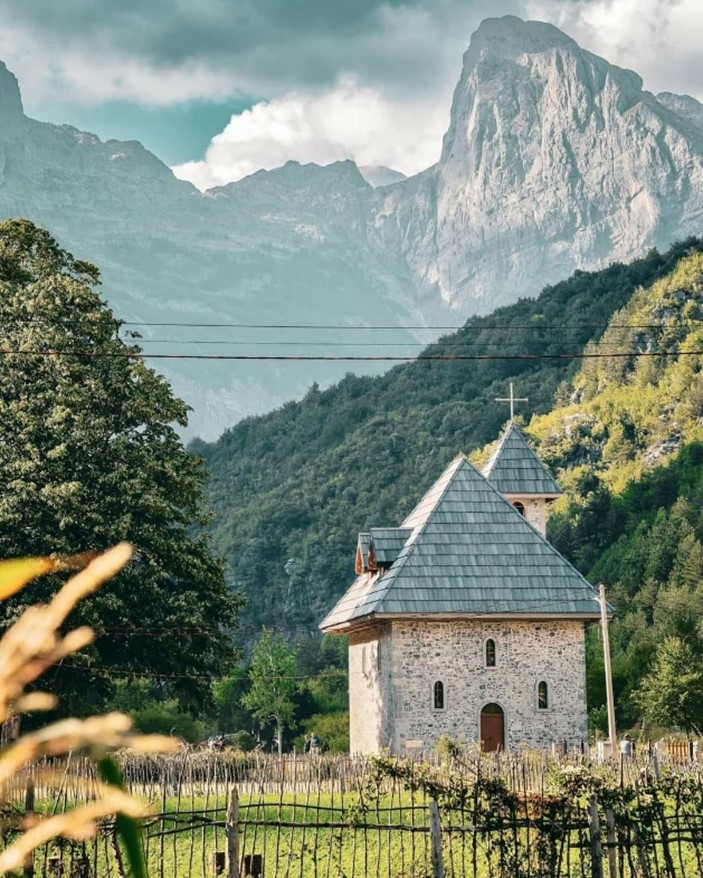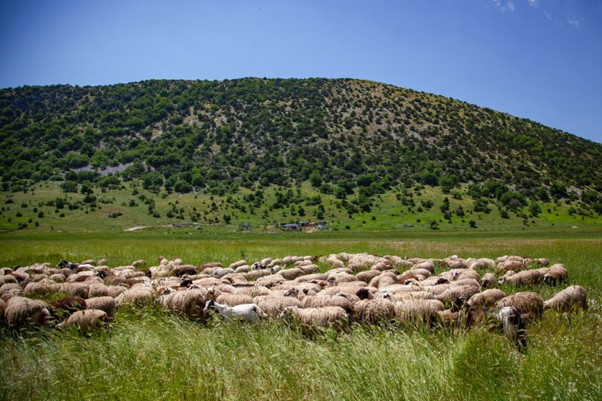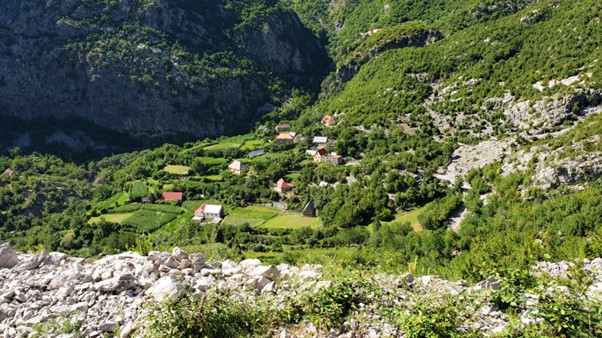By Prof Klodiana Gorica (Department of Marketing and Tourism, University of Tirana, Albania)
Albania is known for its diverse landscapes that collectively contribute to the country’s natural beauty, biodiversity, and cultural heritage. Albania’s mountains in particular present excellent opportunities for sustainable rural tourism and ecological conservation, but also pose challenges to local communities. This blog provides a comprehensive overview of the marginalised mountain ranges of Albania and dives into the diverse set of social, economic, and ecological challenges they face. We also introduce promising emerging solutions ranging from sustainable tourism initiatives that bring about economic opportunities, to infrastructure improvements and agricultural revitalisation initiatives that support niche agricultural products.
Mountain ecosystems are considered centres for endemism and biodiversity hotspots. They support natural livelihoods and host significant watershed resources, biological diversity, and unique flora and fauna. Mountains have often been referred to as “natural water towers” because they contain the headwaters of rivers that are vital for maintaining human life in densely populated areas downstream. Many are particularly fragile and vulnerable to the adverse effects of climate change and require specific protective measures.
A First Glance at the Mountains of Albania
Nestled in the heart of the Balkan Peninsula, Albania – the Land of Eagles – boasts a varied and predominantly mountainous terrain. This provides an ideal backdrop for outdoor activities like hiking and mountaineering. Dr Zamir Dedej (Institute of Nature Conservation in Albania), for example, observes increasing tourism in areas like Thethi and Valbona, accompanied by developing infrastructure (guest houses, hotels, restaurants, etc.) and urbanisation. Beyond attracting eco-tourists, Albania’s highlands are home to unique cultures and nature-based livelihoods nurtured over generations in challenging terrains. Remarkably, only 24% of Albania’s land is flat, meaning that most of its agricultural areas lie on elevated slopes (MAFCP, 2011). In fact, a mere 44% of Albania’s arable land has a slope of 5% or less (MAFCP, 2011).
Arable land describes any land capable of being ploughed and used to grow crops.

Church in Albania’s Theth Mountain Area
Some of the main mountain ranges in Albania include:
- Albanian Alps (Bjeshkët e Namuna): Located in northern Albaina, near the borders of Kosovo and Montenegro, these alps are a segment of the Dinaric Alps. They are characterised by rugged terrains, deep valleys, and high peaks, with the highest, Jezerca, towering at 2,694 metres.
- Pindus Range: This range holds significant ecological importance, housing a variety of flora and fauna and several endangered species.
- Korab Mountains: Situated to the east of Albania, these mountains feature Mount Korab, the highest peak in both Albania and North Macedonia at 2,764 metres.
- Sharr Mountains: These mountains stretch across the borders of Albania, North Macedonia, and Kosovo.
- Ceraunian Mountains and Llogara Pass: Located on the southwestern coast of Albania, these mountains are known for their stunning coastal views and the Llogara Pass, a scenic route that winds its way through the mountain range.
- Tomorr Mountains: Located in central Albania, the Tomorr Mountains are characterised by their unique geological formations and opportunities for natural exploration.
- Dajti Mountain: Located near Tirana, Albania’s capital, this mountain offers recreational activities and panoramic views of the city and its surrounding landscape.
Marginalisation Challenges: Uncovering Periphery Traps in Albania
Many of Albania’s mountainous regions have historically struggled with issues such as poverty, limited infrastructure, depopulation, and inadequate access to education and healthcare. Marginalised mountain areas in Albania often face more significant socio-economic challenges than other parts of the country, primarily because of their geographical isolation, harsh terrains, and limited access to essential services and economic opportunities. Compared to more developed regions, these rural areas traditionally suffer from a lack of infrastructure and significant economic and social disparities. In the last 10 years, Albania has also faced increasing problems related to climate change and the unsustainable use of natural resources.

Velipoje Shkoder
The Albanian government and various international organisations have begun to implement initiatives that address the marginalisation challenges of the country’s rural areas. But what are these challenges exactly? Prof Fatmir Guri, Head of the Department of Economics and Rural Development Policies at the Agricultural University of Tirana and advisor to the Albanian Minister of Agriculture, divides these challenges into four main categories:
- Economic barriers: Many marginalised rural areas in Albania experience high unemployment rates and limited economic opportunities. This can lead to increased poverty and limited access to essential services. According to the last publication of Eurostat (Eurostat, 2020), almost 60% of Albania’s population living in rural areas was at risk of living in poverty in 2021.
- Agriculture and small farming systems: Agriculture plays a significant role in the economy of rural Albania. However, outdated farming practices and lacking access to technology and agricultural infrastructure can further the existing plight of extremely fragmented land structures and small farms, and hinder agricultural productivity and development.
- Outmigration: Migration from rural to urban areas has been a characteristic of the Albanian countryside since the early 1990’s. Many young people from marginalised rural areas migrate to urban centres or other countries in search of better job opportunities. These migration flows lead to the depopulation of rural Albanian areas and reduce their social capital and economic and social development potential. This also often results in a loss of traditional knowledge and culture.
- Land ownership and property rights disputes: Land ownership disputes and unclear property rights can undermine and have in the past hindered economic development and investment in rural Albanian areas.
According to Etleva Dashi, Professor at the Agricultural University of Tirana, the average number of employees in Albanian rural businesses lies at approximately 3.5 people. Rural businesses are largely small-scale and run by older family members who have not emigrated to more urban areas. Village abandonment by younger generations and a lacking desire to continue agricultural work are some of the main problems faced in Albanian marginalised regions. Both a dwindling work force and insufficient infrastructure, such as poor rural roads, stand to negatively impact the success of rural and agritourism initiatives. Such circumstances pose a particular threat to Albania’s Dibër Region and Tropojë.
Visions of a Post-Marginalised Albania: Improving Resilience for a Green, Digital, and Healthy Future
Like its neighbours in the region, Albania has faced challenges posed by periphery traps. To combat these, initiatives have focused on improving infrastructure, promoting sustainable development, preserving the environment, and enhancing access to education and healthcare. Expert in sustainable agriculture at the University of Tirana, Zef Gjeta, describes measures that could mitigate existing marginalisation issues, such as the improvement of the road infrastructure, direct assistance for farm development, the establishment of agribusiness through agritourism, and entrepreneurship training for young people in rural areas.
Overall, improving a region’s resilience is one of the most effective practices undertaken by public and private institutions to optimise resource usage. Challenges to achieving good resilience are manifold, but public institutions indicate its massive importance in facing changing external circumstances, such as those brought about by the negative social, environmental, and economic repercussions of global warming. Achieving sustainable business practices in an inclusive way, for example, can “softly” challenge periphery traps in a country.
In Albania, so-called Green Initiatives promote sustainable agriculture and agritourism practices that are suitable for mountainous terrains or encourage organic farming paired with traditional farming knowledge. Digital Connectivity Initiatives improve digital infrastructure, including internet connectivity and mobile networks, to enable access to digital services. Agritourism Initiatives centre around the creation of recreational spaces, such as parks and community gardens.
Transforming marginalised mountainous areas in Albania requires a comprehensive and integrated approach that addresses good resilience, as well as various aspects of economic, social, and environmental development. Within these initiative types, concrete actions to sustain economic diversification include:
- Assessing the current state of Albanian marginalised mountainous areas by identifying strengths, weaknesses, opportunities, and threats. Engaging local communities, stakeholders, and experts to gather insights and build a comprehensive understanding of the challenges and aspirations within a region.
- Developing an action plan to reach sustainable mountain environments on the basis of existing strategies and revising existing sectoral strategies so that they are in accordance with international eco conventions.
- Collaborating with private sector partners, NGOs, and international organisations to leverage expertise, funding, and resources for sustainable development projects. Working to attract investments in key sectors such as renewable energy, tourism, and agribusiness to stimulate economic growth.
- Developing basic infrastructure such as roads, bridges, and water supply systems to enhance connectivity and living conditions.
- Supporting the development of eco-tourism by preserving natural landscapes, developing and promoting hiking trails, and organising adventure activities and cultural experiences.
- Encouraging entrepreneurship and small business development by providing access to funding, training, and resources for starting and expanding ventures.
- Fostering value-added processing of local agricultural products to create niche markets and increase income for local farmers.
- Promoting high-quality niche agricultural products and touristic areas.
How are Albanian marginalised mountain regions being developed today?
Generally, Albania has favourable conditions for rural tourism and agritourism. Rural tourism is viewed as a new component of Albanian tourism that provides opportunities for small villages and rural regions located in mountains, on hills, and near rivers, lakes, and farms. For rural tourism to flourish, however, local groups and agricultural institutions must first become sustainable in benefiting economically, socially, and respectfully from the surrounding natural resources they rely on.

A View from Selca of Kelmendi
Rural tourism is an important development tool for the mountainous areas in Albania. Today, more than 300 agritourism units employ over 2,500 residents in rural areas – a figure that doubles during the summer months (Domi et al., 2021). Through the IPARD programme, which will see €146 million invested in Albania’s agricultural sector, the Albanian government has invested €7.2 million in 42 agritourism units. Young people manage about half of these units (Domi et al. 2021).
Similar to the production of the Serra da Estrela cheese in rural Portugal, Albania today also focuses on the development of territory products, which are often produced in remote rural communities and act as a driver of economic and social progress. Economic analyses in Albania show that consumers are willing to pay 30-50% more for products that come from an area that is well-known for specific, high-quality products made with traditional processing techniques (Kokthi et al 2021 ). In 2022, four such local products included “Mishavina e Bjeshke te Kelmendi” cheese, Bedunica” honey, “Malësi e Madhe,” or boiled cheese, and “Rrunja” goat cheese from Dibër.
One of MARGISTAR’s central objectives is to define regional periphery traps by engaging with stakeholders from marginalised mountainous regions. Another is to incorporate these findings into policy discussions. Regularly assessing the progress of marginalisation development projects is one of the main tasks of national governmental bodies. This is combined with gathering feedback from local communities and stakeholders to make necessary adjustments and improvements. Combining these two strategies and tailoring them to the specific needs of Albania’s marginalised mountainous areas can create a roadmap for the country’s sustainable, green, digital, and healthy future that empowers local communities and preserves the natural beauty of its regions.
References
DOMI, S., KAPAJ, I., & ARAPI, F. Agritourism development in Albania: future challenges of policy m ak ing. In 3rd INTERNATIONAL CONFERENCE (p. 220).
Kokthi, E., Guri, G., & Muco, E. (2021). Assessing the applicability of geographical indications from the social capital analysis perspective: Evidences from Albania. Economics & Sociology, 14(3), 32-53.


